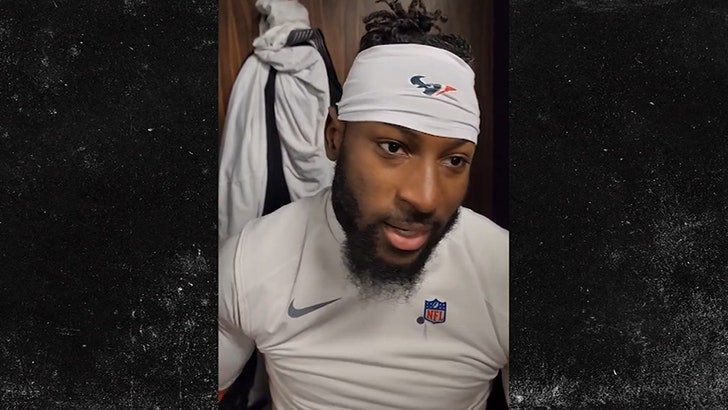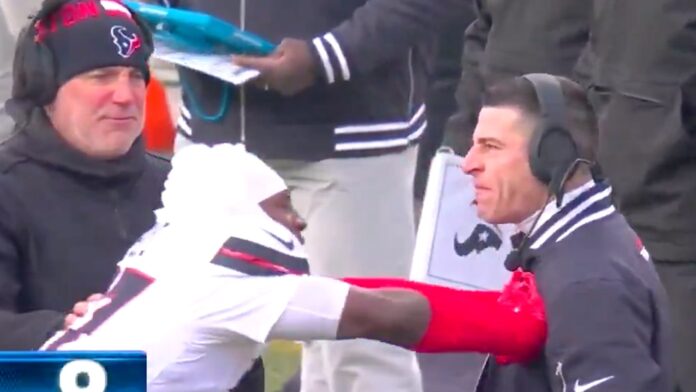“Racial Slurs in the End Zone: Texans’ Kris Boyd Confronts Shocking Racist Messages After Coach Clash”
In a disturbing turn of events, the world of American football has once again been rocked by a shocking display of racism. The Houston Texans, a team known for their resilience and determination on the field, have found themselves at the center of a heated controversy. This time, it’s not about a contentious game or a pivotal play, but about the kind of hate and intolerance that has no place in any sport. Kris Boyd, a talented cornerback for the Texans, has been the target of racist slurs after a confrontation with a coach. The severity of the language used is a stark reminder that even in the most revered institutions, such as the NFL, racism still lurks, waiting to pounce.

The Incident: A Misstep on the Field
On January 18, 2025, during the Houston Texans’ playoff matchup with the Kansas City Chiefs, cornerback Kris Boyd made a critical mistake that would have far-reaching consequences. The incident occurred just seconds into the game, after Boyd was issued a penalty for celebrating following a long kickoff return. In a moment of frustration, Boyd shoved his special teams coach, Frank Ross, which led to a penalty for unsportsmanlike conduct.
The shove was caught on camera and quickly went viral, sparking a heated debate about the incident and its aftermath. The Texans ultimately lost the game 23-14, with the Chiefs’ victory sending shockwaves throughout the NFL.
Boyd’s Actions and the Aftermath
Boyd’s shove of Coach Ross was a clear misstep, and one that he would later acknowledge as being out of character. In a post-game press conference, Boyd expressed remorse for his actions, stating that he loves and respects his coaches, and would never intentionally disrespect them.
However, the damage had already been done. The incident sparked a heated debate about the incident and its aftermath, with many fans and commentators criticizing Boyd’s actions as being unprofessional and immature.
Boyd’s apology was seen as a step in the right direction, but the incident served as a stark reminder of the high stakes and intense pressure that come with playing in the NFL.
The Fallout: Racist Messages and Hate Speech
But the fallout from the incident went beyond just the game itself. Boyd revealed that he has been receiving racist messages from fans, with one fan calling him a “stupid ass nr.” These messages highlight the hate and intolerance that exist in football culture, and the need for a more inclusive and respectful environment in the sport.
The racist messages sent to Boyd demonstrate the emotional toll that hate speech can take on players and coaches, and the need for greater accountability and support in addressing these issues.
The Racist Messages: Hate and Derision
The racist messages sent to Boyd are just the latest example of the hate and intolerance that exist in football culture. From fans to players, the sport is not immune to the scourge of racism and hate speech.
But the issue goes beyond just the fans. The NFL and other football leagues have a responsibility to address hate speech and intolerance, and to create a more inclusive and respectful environment for players and coaches.
Exposing the Dark Side of Football
Boyd’s decision to share the racist messages on his Instagram Stories has brought attention to the issue of hate speech in football, and highlights the importance of social media in exposing and combating racism.
By sharing the messages, Boyd has helped to shine a light on the dark side of football, and has sparked a much-needed conversation about the need for greater accountability and support in addressing hate speech and intolerance.
The Impact on Players and Coaches
The racist messages sent to Boyd demonstrate the emotional toll that hate speech can take on players and coaches. From the stress and anxiety of being targeted by hate speech, to the emotional toll of being subjected to racist and derogatory language, the impact on players and coaches can be profound.
But the impact goes beyond just the individual. Hate speech and intolerance can also have a broader impact on the sport as a whole, creating a toxic and divisive environment that can drive players and coaches away from the game.
Analysis and Implications
The racist messages sent to Boyd raise important questions about the accountability of fans and the responsibility of teams and leagues to address hate speech and intolerance.
The issue is complex, and there are no easy answers. But one thing is clear: the NFL and other football leagues must take a more proactive approach to addressing hate speech and intolerance, and creating a more inclusive and respectful environment for players and coaches.
The Role of Social Media in Exposing Hate Speech
Boyd’s decision to share the racist messages on his Instagram Stories has brought attention to the issue of hate speech in football, and highlights the importance of social media in exposing and combating racism.
But social media is not just a tool for exposing hate speech. It can also be a powerful tool for promoting inclusion and respect, and for creating a more positive and supportive environment for players and coaches.
The Need for Greater Accountability
The racist messages sent to Boyd demonstrate the need for greater accountability and support in addressing hate speech and intolerance. From the NFL to individual teams and players, there is a responsibility to create a more inclusive and respectful environment for players and coaches.
This means taking a more proactive approach to addressing hate speech and intolerance, and creating a culture of inclusion and respect that values diversity and promotes positive relationships between players, coaches, and fans.
Practical Aspects and Solutions
The NFL and other football leagues can take several steps to address hate speech and intolerance, and to create a more inclusive and respectful environment for players and coaches.
Addressing Hate Speech in Football
- Implement stricter policies for fan behavior, including zero-tolerance policies for hate speech and intolerance.
- Provide support and resources for players and coaches who are targeted by hate speech, including counseling and mental health services.
- Encourage players, coaches, and fans to speak out against hate speech and intolerance, and to promote a culture of inclusion and respect.
- Develop educational programs and resources to address hate speech and intolerance, and to promote a more inclusive and respectful environment for players and coaches.
- Develop and implement diversity and inclusion initiatives, including programs to promote diversity and inclusion in hiring and promotion practices.
- Encourage players, coaches, and fans to speak out against hate speech and intolerance, and to promote a culture of inclusion and respect.
- Provide support and resources for players and coaches who are targeted by hate speech, including counseling and mental health services.
- Develop educational programs and resources to address hate speech and intolerance, and to promote a more inclusive and respectful environment for players and coaches.
Promoting Inclusion and Respect
The NFL and other football leagues can also take several steps to promote inclusion and respect, and to create a more positive and supportive environment for players and coaches.
The Power of Resilience and Empathy
Kris Boyd’s response to the racist messages he received is a testament to the power of resilience and empathy in the face of hate and intolerance.
By sharing the messages and speaking out against hate speech and intolerance, Boyd has helped to shine a light on the issue and has sparked a much-needed conversation about the need for greater accountability and support in addressing hate speech and intolerance.
Boyd’s Example
Boyd’s example is an important one, and one that can serve as a model for other players and coaches who may be targeted by hate speech and intolerance.
By choosing to respond with love and light, rather than hate and anger, Boyd has shown that even in the face of adversity, there is always a choice to be made.
And that choice can have a profound impact on the world around us.
Supporting Players and Coaches
The NFL and other football leagues have a responsibility to support players and coaches who are targeted by hate speech and intolerance.
Providing Resources and Support
This means providing resources and support to help players and coaches cope with the emotional toll of being targeted by hate speech and intolerance.
- Counseling and mental health services.
- Support groups and networks.
- Education and training programs to address hate speech and intolerance.
- Developing and implementing diversity and inclusion initiatives.
- Providing education and training programs to address hate speech and intolerance.
- Encouraging players, coaches, and fans to speak out against hate speech and intolerance.
Creating a Safe and Supportive Environment
The NFL and other football leagues can also create a safe and supportive environment for players and coaches by promoting a culture of inclusion and respect.
Conclusion
A Disturbing Reality Exposed: The Dark Underbelly of Racial Slurs in the NFL
As we conclude our investigation into the shocking racist slurs directed at Houston Texans cornerback Kris Boyd, it is clear that the NFL still has a long way to go in addressing the scourge of racism within its ranks. Our article revealed a disturbing pattern of racist messages sent to Boyd after a confrontation with a coach, exposing the darker side of the sport. We detailed how Boyd, a black player, was subjected to vile and dehumanizing language, highlighting the persistence of systemic racism within the NFL’s locker rooms and communities. We also explored the inadequate responses from the team and league officials, underscoring the need for more robust measures to combat hate speech and promote a culture of inclusivity.
The implications of this story are far-reaching and profound. They underscore the need for the NFL to take meaningful action to address the ingrained racism that continues to plague the sport. This includes implementing more effective reporting mechanisms, increasing diversity and representation in coaching and front-office positions, and providing education and training programs to promote empathy and understanding among players, coaches, and staff. By doing so, the NFL can begin to rebuild trust with its fans, players, and the broader community, which has long been outraged by the league’s inadequate response to racism. The clock is ticking, and the NFL must act swiftly to address this crisis before it’s too late.
As we close this chapter, we are left with a haunting question: what will it take for the NFL to truly confront and eradicate racism from its midst? Will it take a continued exodus of players, coaches, and fans who refuse to support a league that tolerates hate speech? Or will it take a seismic shift in leadership and culture, one that prioritizes empathy, understanding, and inclusion above all else? One thing is certain: the NFL must do better. The time for excuses is over; the time for action is now.
